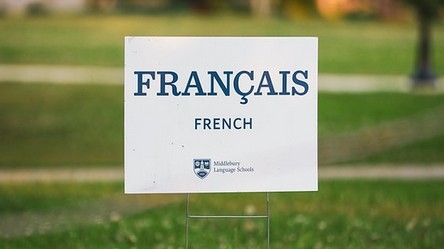Language Learning in the Age of AI
| by Drew Philp

I will never forget the first conversation I had in French. I was in my mid 30s, and in the course of working on a book about America’s wars in the Mid East. I found myself sitting on the terrasse outside the dining hall at Middlebury College’s immersive summer language program.
Across from me sat a Ghanaian doctor who, with patience approaching grace, listened to my painful attempts to explain what I was doing there and where I had come from.
I’m certain she has no memory of this small conversation. But for me those stumbling, broken attempts at making myself understood were a milestone akin to graduation. Alternatively frustrating and punctuated by moments of delight, this conversation represented both a beginning and an end.
For practical reasons I needed passable French to be able to speak with the colleagues with whom I would be working while reporting my book. But I also had a secret fear that upon my death I would come to find the only language I spoke was the one I had been given. That conversation was the starting point of many more years of study, flirtations with other languages, miscommunications, sparks of linguistic triumph and delight, heartbreak, and recognition. It was also the first step out of a cave made of a single language and into a greater understanding of our world.
With the advent of language translation AI, some have asked if this new technology will spell the end of foreign language learning and the death of moments like this one. Apple has even recently released an OS update that will allow its AirPods to translate live language, a remarkable step toward the real-life Babblefish and Universal Translators of science fiction.
These advances are powerful and welcome new flowers in the bouquet of intercultural communication. However, they will never replace language learning. Asking why someone would want to learn a language in the age of AI is like asking why anyone should learn to cook in the era of Uber Eats, or play a musical instrument in the age of Spotify. These new tools will only ever act as complements, rather than replacements, because acquiring another language transforms not just what we might say, but our ability to hear what life itself has to tell us.
***

I came to Middlebury’s immersive language program without speaking a single word of French, and was dropped into an environment where I may have been expelled were I caught speaking anything but. This does curious things to the brain. If immersive programs like this are taken seriously, one begins not just to speak in a foreign language, but to think in one. I could actually feel my brain being rearranged. Like strands in a muscle daily worked to failure, I could sense the pathways between synapses and regions strengthening and changing in uncanny ways. My dreams were unusually vivid and strange.
Science actually backs this up. Learning and using a second language has been shown to change white matter tracts in the brain, increases grey matter in certain regions, and promotes shifts in connectivity between and within those regions. It shows all kinds of positive cognitive effects such as better attentional control and improved task switching, it can delay cognitive decline associated with aging, and much more.
These benefits have all been potentially great for my current and future brain, but the immediate effects of living in an immersive environment were more humbling. Especially at the beginning of my study, when my vocabulary and syntax were limited like a child’s, I often found myself angry and frustrated in ways I hadn’t experienced since I was, well, a child.
Unable to make myself understood, unable to form complex thoughts or arguments, little tantrums began to brew in my head. Limiting myself to the diction of a toddler took from me the primary mode through which I made sense of the world, a humbling experience for someone who makes their living shaping language. These emotions are embarrassing to admit now, but are a perfect encapsulation of the philosopher Ludwig Wittgenstein’s maxim, “the limits of my language are the limits of my world.”
Language has immense influence on how we see, interact, and interpret the world around us. Expanding our use of language can expand our ways of thinking, and as Orwell so effectively noted, can shrivel it as well. Before my understanding of the world was enriched by learning a second language, it was temporarily limited by it. Only then did I realize what I had lost— and what I would gain.
***
“The broadening of the mind” isn’t just some academic exercise of the ivory tower. In a very real way it is also anathema to the prejudice and cultural balkanization pushed since the dawn of time by a certain subset of cynical politicians and public figures. It is an age-old bulwark against hatred, division, and even war.
When I was just 12 years old, I was lucky enough to be selected as an exchange student in Japan. One evening, sitting in my similarly-aged host brother’s study, we played a skiing video game with a friend of his. My Japanese was nearly non-existent and his English was limited, but children don’t really care. I would only learn much later that our young age was precisely the reason we were selected for the program.
My host-brother took a particularly nasty digital spill on the slopes.
“Ah, wipeout,” I said.
My host brother and his friend peeled into laughter. I was unsure of what I had said that was so funny.
“Wipeout?” I repeated. Their laughter became uncontrollable. We all took turns with the word, tossing it to one another like a baseball, and soon all three of us were rolling in great howling filigrees, each mention eliciting new petals of hysterics. This moment is among the fondest of my life. Easy translation would have surely killed it.
Not even 60 years earlier our grandfathers would have been, quite literally, trying to murder one another in the Second Great War. It is not always the precise language of diplomacy that prevents future conflict.
In more recent times, reliance on digital and AI translation has also had life-and-death impacts. Of the many reasons it is unlikely you have heard about one of the deadliest conflicts of the 21st century and a probable genocide, is because a language wasn’t included in major translation services such as Google. Until recently, Tigrinya, the primary language spoken in Tigray, Ethiopia and Eritrea, wasn’t available on most language platforms including social media. This significantly hampered efforts by journalists like myself and starving citizens to get their voices and stories to the world.
While excluding Tigrinya from major translation services certainly wasn’t malicious, and there are many other factors that lead to this conflict remaining largely secret, what happens when the companies that dominate these technologies determine that a language isn’t useful or profitable? What happens when a government or other entity exerts pressure on profit-driven organizations to change offerings or translations? There have been many instances of governments or other entities banning or suppressing languages. Who has the power if we cede the knowledge of languages to corporations?
***
With all of this said, digital and AI translation can improve life considerably. I live in Berlin, Germany and being able to point my phone at scary letters from the finanzamt and receive an immediate translation is a revelation. High-quality AI assisted translation made signing my first lease in Deutschland a lot less worrisome. Having the ability to live-translate complex language at immigration hearings through earbuds may save me from having to drag my partner or fluent friends to future appointments. Tools such as these make a global world more possible and I am grateful for them. That is undoubtedly good.
However, a bigger world tends to bring bigger problems, or at least new ones. Like diseases that now spread more rapidly due to the gift of air travel, or the dangerous hate speech that can be amplified by the very mediums that allow us to connect across continents, the benefits that these technologies bring are almost always tempered by drawbacks. When it comes to AI translation, the name for the most profound of these downsides is alienation. Sometimes a larger world is also more overwhelming.
In my life in Germany were I to rely solely on these technologies, the bonds that make life such a gift would be impoverished or nonexistent. Earbuds and AI will never have the fluency or ease it would take to make friends with the guys who drink at the kneipe on my corner and make me feel welcome thousands of miles from home. Had my wife, a native German speaker, never learned to speak English it is unlikely we would have fallen in love. If I never become fluent in German I’ll never fully understand her culture and can never fully understand her, translation apps or not.
My German isn’t very good yet, but I’m working on it. I fumble through conversations at the bakery or listen intently around dinner tables and barrooms, just like I did when I was learning French. In the process I make friends and my brain gets stronger and I discover new ways of looking at the world around me.
While that particular book I was working on never worked out, my life has been changed indelibly by taking those first steps to learn a new language. Without it, I don’t think I would have had the courage to move to a different continent, I wouldn’t have met people who are still dear friends and colleagues, I wouldn’t have expanded my mind in ways that are otherwise impossible. I wouldn’t have the love of my life. Simply, I would be less of a person without it.
I hold with the ancien king Charlemagne that, “When you learn a new language you grow a new soul.” With a single conversation I had with one doctor, I stepped into a greater and more humane world, greater and more humane myself. This is what a place like Middlebury offers. A chance to make friends radically different from you, the opportunity to fall in love, to keep decentralized knowledge alive, to be humbled by mistakes and strong feelings, to have an educational experience that can drastically change your outlook on the world and maybe even heal it, just a little bit, while laughing in delight.
While digital and AI translation has its place, it will never replace experiences such as these.

